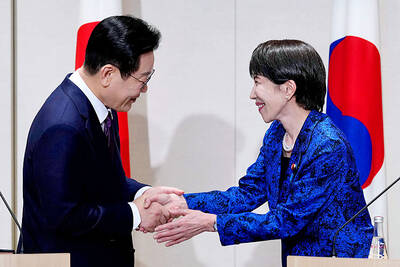Japanese efforts to recover and dispose of hundreds of thousands of chemical weapons abandoned in China by the Imperial Army at the end of World War II will take five years longer than planned, an official said yesterday.
A 1997 international convention required Japan to remove the weapons by April 2007.
However, Japan and China requested a five-year extension until 2012 because of the large number of weapons still to be unearthed and destroyed.
The Organization for the Prohibition of Chemical Weapons, the Hague-based organization that oversees the treaty, approved the extension last month, said Keigo Akashi, a Cabinet Office official in charge of the chemical weapons disposal project.
DISPOSAL FACTORY
Akashi said Japan wants to make preparations to build a chemical weapons disposal factory in Jilin Province in northeastern China by the end of this March, pending Chinese government approval.
Japan has so far removed 38,000 chemical weapons.
Japan's Imperial Army controlled China's northeast for a decade before its World War II defeat, and left behind about 700,000 chemical weapons -- a lingering source of resentment for many Chinese. Nearly half of the weapons are believed to remain in the Jilin area, according to a Japanese government estimate.
Beijing says that abandoned chemical weapons have killed at least 2,000 Chinese since 1945.
Disposal of abandoned munitions is a rare point of agreement between the normally estranged Chinese and Japanese governments.
Japan's relations with China have fallen to their lowest in decades over Prime Minister Junichiro Koizumi's visits to a Tokyo war shrine.
Critics say the visits glorify the country's past militarism, while territorial disputes and disputes over history school books that some say whitewash Japan's wartime atrocities have added to the tensions.

Indonesia and Malaysia have become the first countries to block Grok, the artificial intelligence (AI) chatbot developed by Elon Musk’s xAI, after authorities said it was being misused to generate sexually explicit and nonconsensual images. The moves reflect growing global concern over generative AI tools that can produce realistic images, sound and text, while existing safeguards fail to prevent their abuse. The Grok chatbot, which is accessed through Musk’s social media platform X, has been criticized for generating manipulated images, including depictions of women in bikinis or sexually explicit poses, as well as images involving children. Regulators in the two Southeast Asian

COMMUNIST ALIGNMENT: To Lam wants to combine party chief and state presidency roles, with the decision resting on the election of 200 new party delegates next week Communist Party of Vietnam General Secretary To Lam is seeking to combine his party role with the state presidency, officials said, in a move that would align Vietnam’s political structure more closely to China’s, where President Xi Jinping (習近平) heads the party and state. Next week about 1,600 delegates are to gather in Hanoi to commence a week-long communist party congress, held every five years to select new leaders and set policy goals for the single-party state. Lam, 68, bade for both top positions at a party meeting last month, seeking initial party approval ahead of the congress, three people briefed by

The Chinese Embassy in Manila yesterday said it has filed a diplomatic protest against a Philippine Coast Guard spokesman over a social media post that included cartoonish images of Chinese President Xi Jinping (習近平). Philippine Coast Guard spokesman Jay Tarriela and an embassy official had been trading barbs since last week over issues concerning the disputed South China Sea. The crucial waterway, which Beijing claims historic rights to despite an international ruling that its assertion has no legal basis, has been the site of repeated clashes between Chinese and Philippine vessels. Tarriela’s Facebook post on Wednesday included a photo of him giving a

NONCOMMITTAL: South Korea’s president said the world could only wait for China and Japan to resolve matters amicably through dialogue to secure regional peace Japanese Prime Minister Sanae Takaichi yesterday called on South Korean President Lee Jae-myung to help “ensure regional stability,” as Beijing pressures Tokyo over its stance on Taiwan. The two leaders met in Takaichi’s picturesque home region of Nara in western Japan, days after Lee visited Chinese President Xi Jinping (習近平) in Beijing. They agreed to strengthen cooperation on economic security, regional and global issues, as well as artificial intelligence, South Korea’s presidential office said. Looming in the background of the meeting was Japan’s heated diplomatic spat with China, triggered by Takaichi’s suggestion in November that Tokyo could intervene militarily if China attacks Taiwan. China